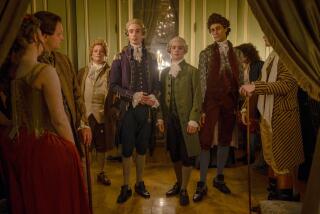AN APPRECIATION : Recalling a Master of Dramatic Timing
- Share via
Not all men can wear tuxedos. On most of us they look rented even if they are not, and our likeliest fate is to be mistaken for a waiter or, possibly, a maitre d’.
But not Rex Harrison, who wore the dinner jacket as naturally as John Wayne wore cavalry blue, and belonged in the drawing room as inevitably as Wayne belonged on a horse.
I realize now that the shadow of mortality was already upon Harrison when I watched him with Stewart Granger and Glynis Johns in Somerset Maugham’s “The Circle” in Manhattan only a week or so before he was forced to give it up.
Even then Harrison, who died on Saturday of pancreatic cancer at the age of 82, walked with small and careful steps and appeared distracted. Yet his voice, that matchless instrument with its swoops and falls and its crackling aristocratic authority, was vigorous as his body was not. In every syllable he uttered there were echoes of Professor ‘Enry ‘Iggins, the wondrous creation for which he will be remembered at least as long as George Bernard Shaw and Lerner and Loewe.
Although he was born to the British professional middle class, Harrison sometimes seemed, like Cary Grant, to have been invented further up-market, so to say, by the roles he played. They created him no less than he created them from the authors’ expert blueprints.
His tall and elegant good looks made him a natural for the well-made drawing room comedies and romantic dramas, with their polished dialogue, their easeful but studied gestures and their underlying assumption that life without butlers, maids and tennis was utterly unthinkable.
It was a line of stagecraft to be supplanted in later years by the rigors of the kitchen sink and dramas that gave the Cockney accent equal time. But it launched Harrison on stage and was carried over to some of his early films as well. As the success of the “The Circle” demonstrated, the well-honed tour of the drawing room in the country house has never lost its appeal, although by now it is heavily encrusted with nostalgia.
Harrison went on to other and more testing work. He was a splendidly splenetic pope, swapping the dinner jacket for even richer apparel and trying to force Charlton Heston to get on with the painting of the ceiling in “The Agony and the Ecstasy.”
Yet essentially, early on, Harrison had found his range. It was narrower than Olivier’s by far; no Lear he. The closer comparison was with David Niven, and both had that enviable gift for perfect timing and immaculate comedy. Niven never found so imperishable a vehicle as “My Fair Lady,” although in “Separate Tables” Niven showed an ability to play the dark side--the realities beneath the veneer of charm--that made you regret there had been more opportunities for him to step outside genre.
Harrison, although he was an indoorsman and a man of speech rather more than action, also had the power to imply the shadows beyond the sparkle, the solids beneath the veneer. In “The Circle,” his own physical frailties aside, he conveyed a melancholy wisdom and weariness, an undertone as much felt as expressed of acceptance of the things of the world as they are. It was from the Maugham text, and it was given full measure by Harrison.
He was married often, and one thought sentimentally that he never quite got over the sudden and unexpected death of Kay Kendall. Yet what also seemed true was that above all Harrison was married to his profession. Acting was not a means to other ends of property or past-times; it was the end.
What mattered above all were the nurturings of applause and affirmation, and the inner satisfaction of knowing that what you were doing, night after night after night as in “My Fair Lady,” you were doing better than anyone else on Earth could do.
In his last days Harrison was receiving thunderous ovations at both ends of his performance: when he made his entrance (pausing, hearing the applause without acknowledging it, though the other players looked upon him, beaming) and then again at the curtain calls.
It was just the final script you would have written for someone who had entertained so many us for so long.
More to Read
Only good movies
Get the Indie Focus newsletter, Mark Olsen's weekly guide to the world of cinema.
You may occasionally receive promotional content from the Los Angeles Times.










